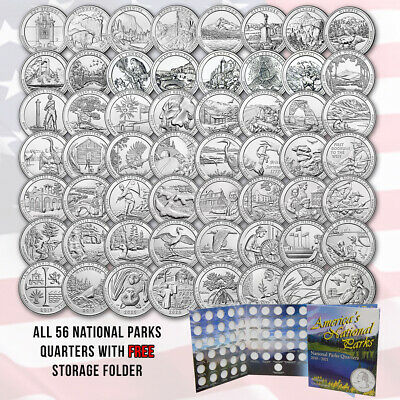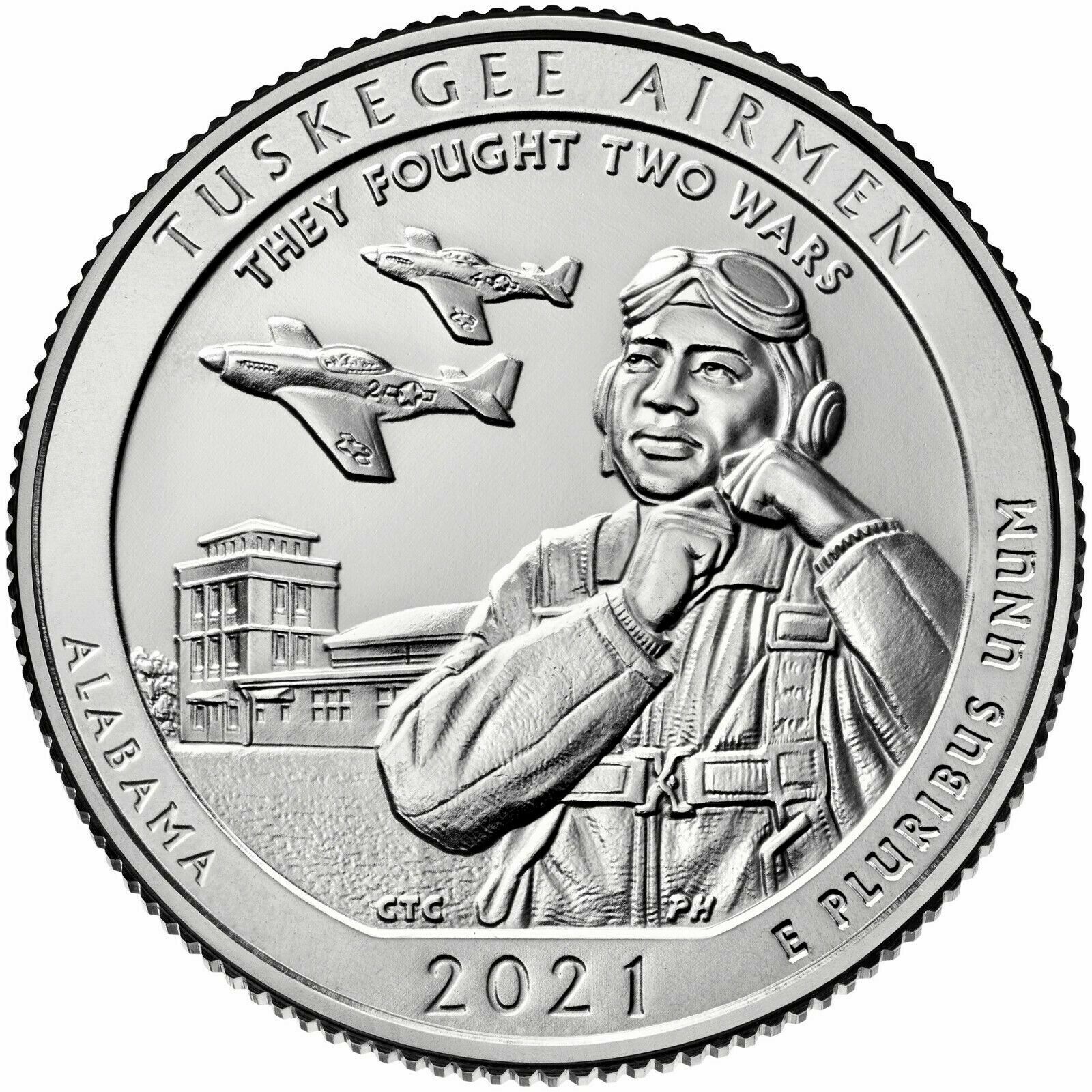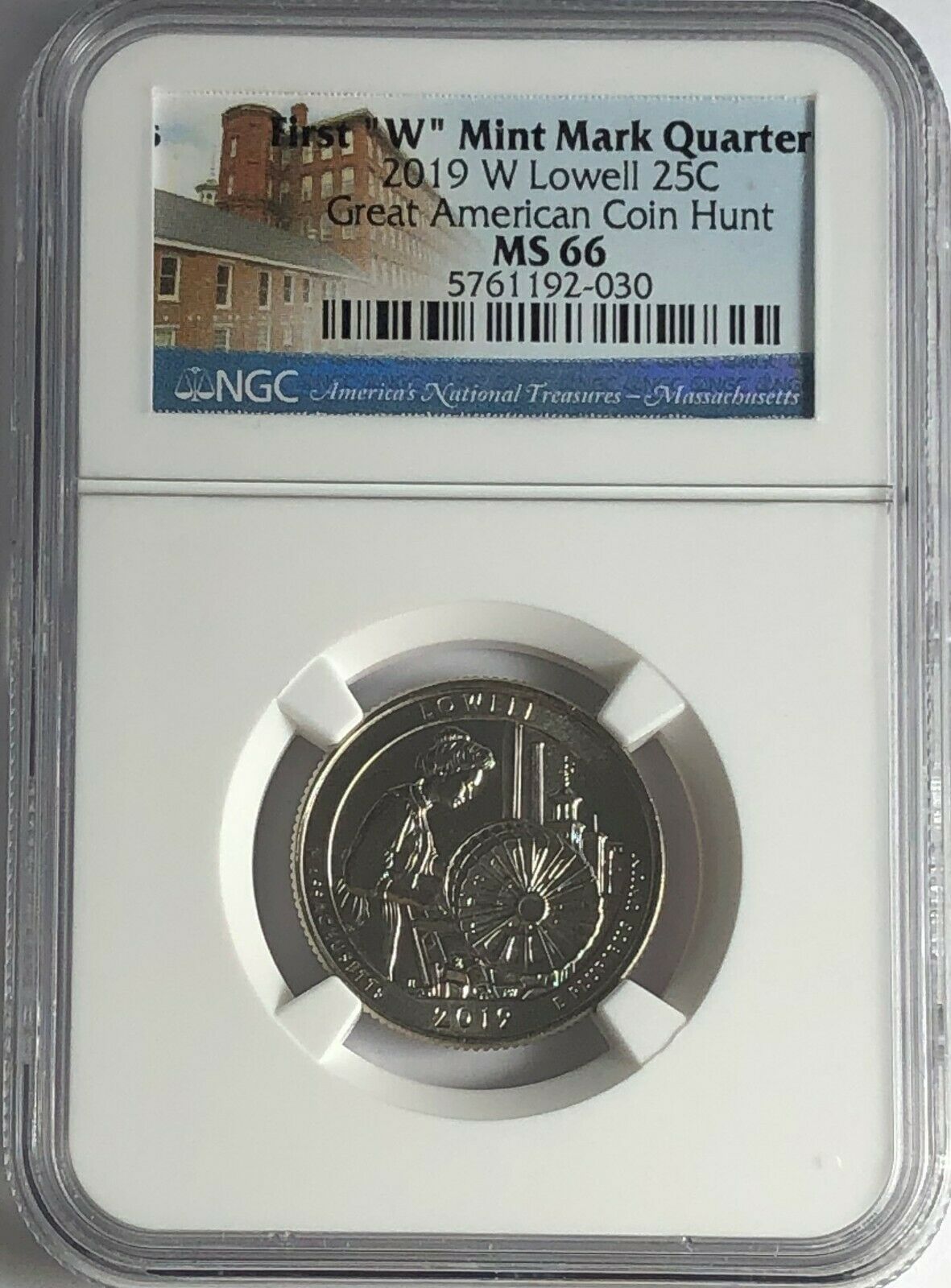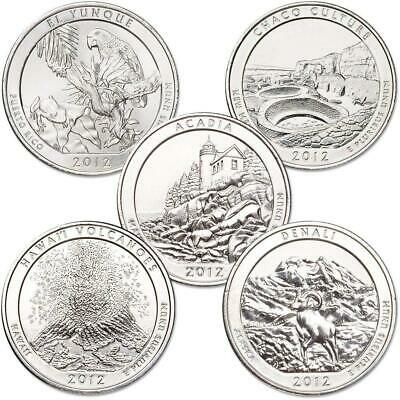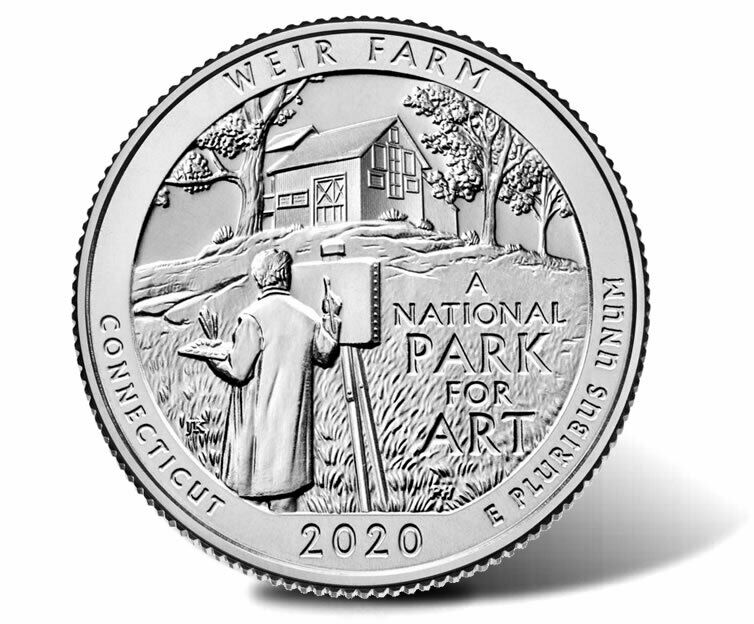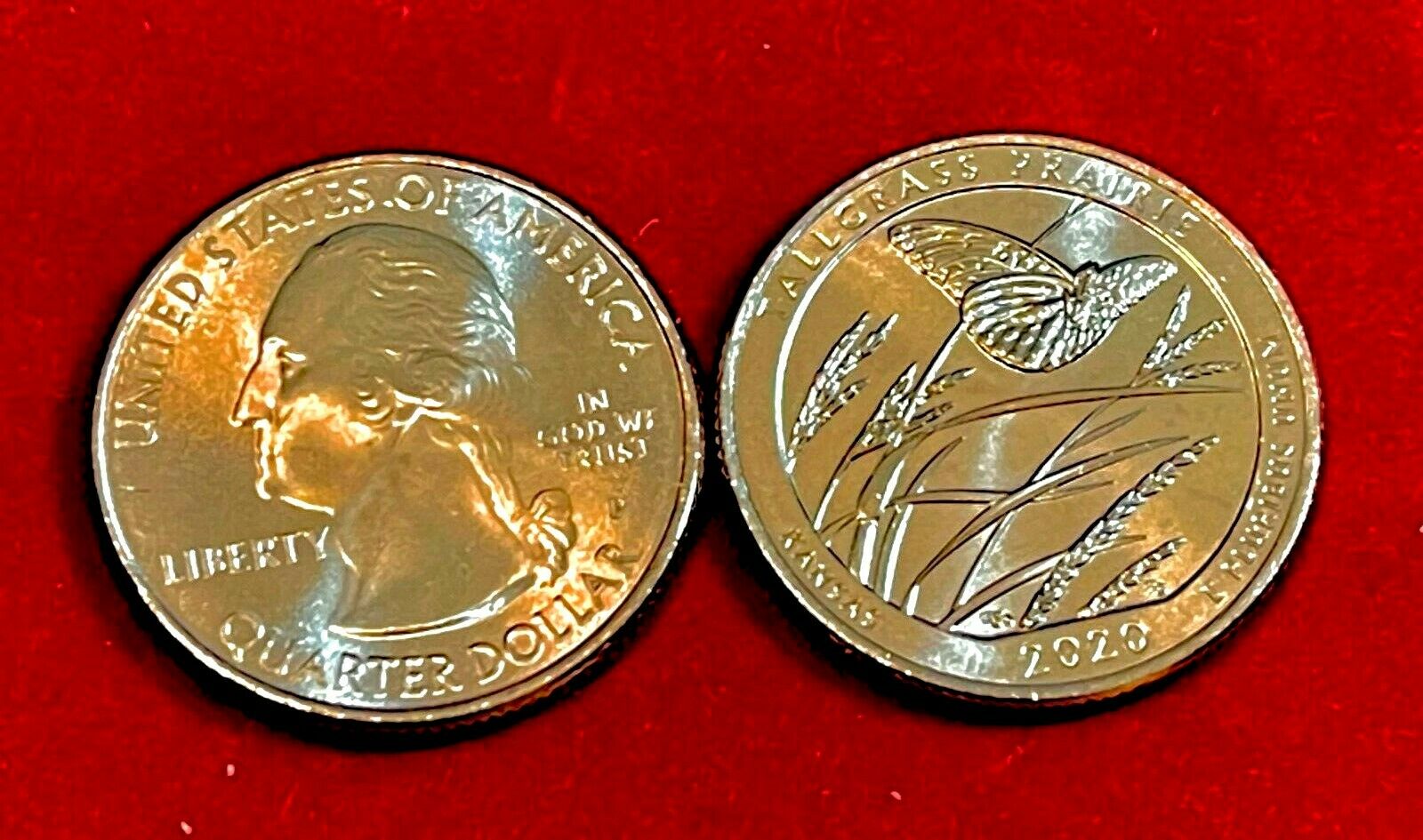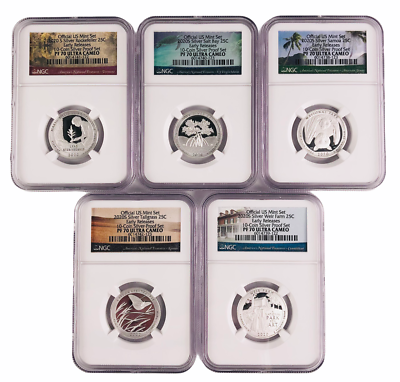-40%
Complete Set Of America The Beautiful Quarters - 56 uncirculated Qtrs 2010-2021
$ 21.09
- Description
- Size Guide
Description
Featuring the first 56 national park quarters issued under the America the Beautiful program, this set is perfect for the beginning collector.The set also includes a display folder that features details and historical facts about each national park featured on its emblematic coin. Not only does this National Park Quarter folder make for a convenient storage solution, but the size and format also makes it easy to exhibit and showcase each quarter coin. The beautiful illustrations on the book are attractive and will add to the appeal of the set.
In the past, quarter design have never been quite this interesting. Beginning in 2010 and continuing up to 2021, the U.S. Mint will create and release 56 different varieties of these national park quarter-dollars, with each coin illustrating a separate scene from national park in every state and territory.
The National Park Quarter set program is scheduled to be completed by the end of 2021, and will contain 56 coins. The specially designed folder contains space for all the quarters which can be added to from the change you collect, or by purchasing rolls of quarters banks. You can also order each year's set from our site as it becomes completed.
Each illustrative release commemorates American heritage in the form of its iconic natural scenery.
National Parks Quarters Details
2010 Quarters
Hot Springs National Park – Arkansas
The first quarter in the series was released on April 19, 2010. The reverse features the façade of the Hot Springs National Park headquarters building with a thermal fountain in the foreground. The headquarters was built in the Spanish colonial revival style and completed in 1936. To the right of the door is the National Park Service emblem.
Yellowstone National Park - Wyoming
The second quarter was issued on June 1, 2010 and features the famous geyser, Old Faithful with a mature bull bison in the foreground.
Yosemite National Park - California
The reverse design features El Capitan, a vertical rock formation which rises more than 3,000 feet above the valley floor and is the largest monolith of granite in the world. The quarter was issued on July 26, 2010.
Grand Canyon National Park - Arizona
Released on September 20, 2010, the reverse design features a view of the granaries above the Canyon near the Colorado River. Stone granaries were used for storing food and seeds between 1050 and 1150 A.D.
Mount Hood National Forest – Oregon
The reverse design is an image of with Lost Lake with Mount Hood in the background. It was issued on November 15, 2010.
2011 Quarters
Gettysburg National Military Park – Pennsylvania
Issued on January 24, 2011, the reverse shows the 72nd Pennsylvania Infantry Monument, which is located on the battle line of the Union Army at Cemetery Ridge.
Glacier National Park – Montana
The reverse depicts a mountain goat looking towards Mount Reynolds towering in the distance. It was issued on April 4, 2011.
Olympic National Park – Washington
The reverse shows a view of Mount Olympus with a Roosevelt elk standing on a gravel river bar of the Hoh River in the foreground. It was released on June 13, 2011.
Vicksburg National Military Park – Mississippi
The reverse shows the U.S. Navy’s U.S.S. Cairo, the first warship sunk in the Civil War. It was issued on August 29, 2011.
Chickasaw National Recreation Area – Oklahoma
Issued November 14, 2011, the reverse shows the Lincoln Bridge, which was built of limestone and dedicated in 1909 to celebrate the 100
th
anniversary of Abraham Lincoln's birth.
2012 Quarters
El Yunque National Forest – Puerto Rico
Released on January 23, 2012, the reverse shows a Coqui tree frog sitting on a leaf and a Puerto Rican parrot behind an air plant with tropical flora in the background.
Chaco Culture National Historical Park – New Mexico
The reverse show two enormous circular ceremonial elevated structures called kivas and the archeological site Chetro Ketl and the north wall of the canyon. It was issued on April 2, 2012.
Acadia National Park – Maine
The reverse shows a view of the Bass Harbor Head Lighthouse and Acadia's rough coastline. Design elements include the coastline, the lighthouse, the pine trees and the ocean. It was released on June 11, 2012.
Hawai’i Volcanoes National Park – Hawai’i
Issued August 27, 2012, the reverse depicts an eruption of Kilauea Volcano, an active shield volcano in the Hawaiian Islands, and the most active of the five volcanoes that together form the island of Hawaiʻi.
Denali National Park and Preserve – Alaska
The reverse design features a Dall sheep with the 20,320-foot Mount McKinley, the tallest mountain in North America rising in the background. It was released on November 5, 2012.
2013 Quarters
White Mountain National Forest – New Hampshire
The reverse design is an image of Mt. Chocorua framed by birch trees. It was released January 28, 2013.
Perry’s Victory and International Peace Memorial – Ohio
Released April 1, 2013, the reverse design is a depiction of the statue of Master Commandant Oliver Hazard Perry with the Peace Memorial located in the distance.
Great Basin National Park – Nevada
The reverse shows a 4,000 year old Bristlecone Pine tree and the rocky glacial moraines where the trees grow. It was issued on June 10, 2013.
Fort McHenry National Monument and Historic Shrine – Maryland
The reverse design is of Fort McHenry—the birthplace of our country’s national anthem, with fireworks over the fort, symbolizing “the rocket’s red glare.” It was released on August 26, 2013.
Mount Rushmore National Memorial – South Dakota
Issued on November 4, 2013, the reverse design displays how Mount Rushmore was created and sculpted and shows men who are adding the final details to Thomas Jefferson's face.
2014 Quarters
Great Smoky Mountains National Park – Tennessee
The reverse shows a historic log cabin surrounded by a forest with a hawk circling above the Great Smoky Mountains. It was released on January 27, 2014.
Shenandoah National Park – Virginia
Released on March 31, 2014, the reverse design depicts a backpacker looking at the view from Little Stony Man summit.
Arches National Park – Utah
The reverse depicts the most widely recognizable landmark in Utah - Delicate Arch, a 65-foot freestanding natural arch. It was released on June 9, 2014.
Great Sand Dunes National Park – Colorado
Issued on August 25, 2014, the reverse features a father and son playing in the sand next to the Medano Creek with mountains and sand dunes in the background.
Everglades National Park – Florida
The reverse design features two waterbirds found throughout the Everglades – the roseate spoonbill and the anhinga. It was released on November 3, 2014.
2015 Quarters
Homestead National Monument of America – Nebraska
Released on February 9, 2015, the design represents the three fundamentals of survival common to all homesteaders: food (corn), shelter (homestead) and water (pump and bucket.)
Kisatchie National Forest – Louisiana
Issued on April 13, 2015, the reverse shows a wild turkey flying over blue stem grass with long leaf pine tree in the background.
Blue Ridge Parkway – North Carolina
The reverse design portrays the curvature of the road hugging the side of a mountain, with the North Carolina state flower – the dogwood - in the foreground. It was released on June 22, 2015.
Bombay Hook National Wildlife Refuge – Delaware
Issued on September 14, 2015, the reverse shows a great blue heron in the foreground and a great egret in the background.
Saratoga National Historical Park – New York
The reverse design shows a close-up of General John Burgoyne surrendering his sword to General Horatio Gates, which marked the beginning of the end of the American Revolutionary War. It was issued on November 16, 2015.
2016 Quarters
Shawnee National Forest – Illinois
The design shows a red-tailed hawk soaring in the sky over Camel Rock with natural vegetation in the foreground. It was released on February 1, 2016.
Cumberland Gap National Historical Park – Kentucky
Released on April 4, 2016, the design shows a frontiersman gazing across the mountains to the West with the words “FIRST DOORWAY TO THE WEST.”
Harpers Ferry National Historical Park – West Virginia
The reverse design shows the John Brown Fort, which was the site of John Brown’s last stand during his raid on the Harpers Ferry Armory. It was released on June 6, 2016
Theodore Roosevelt National Park – North Dakota
Released on August 29, 2016, the reverse shows Teddy Roosevelt on horseback surveying the terrain near the Little Missouri River.
Fort Moultrie (Fort Sumter National Monument) – South Carolina
The reverse is an image of Sergeant William Jasper returning the regimental flag to the ramparts while under attack from a British ship. It was issued on November 14, 2016.
2017 Quarters
Effigy Mounds National Monument – Iowa
The reverse shows an aerial view of mounds in the Marching Bear Group, which contains 10 bear and three bird effigies. It was released on February 6, 2017.
Frederick Douglass National Historic Site – District of Columbia
Issued on April 3, 2017, the reverse displays Frederick Douglass seated at a writing desk with his home in Washington, D.C., in the background.
Ozark National Scenic Riverways – Missouri
The coin design depicts Alley Mill, built in 1894 which was a steel roller mill that was used to convert wheat into flour. The coin was released on June 5, 2017.
Ellis Island – New Jersey
The reverse design depicts an immigrant family approaching Ellis Island with the hospital building in the background. It was issued on August 28, 2017.
George Rogers Clark National Historical Park – Indiana
Released on November 13, 2017, the reverse shows George Rogers Clark leading his men through the flooded plains approaching Fort Sackville.
2018 Quarters
Pictured Rocks National Lakeshore – Michigan
The coin’s reverse depicts white pine trees that grow atop Chapel Rock, located along the coast of Lake Superior. It was issued on February 5, 2018.
Apostle Islands National Lakeshore - Wisconsin
The reverse shows a kayaker paddling along the sea caves at Devils Island with the lighthouse in the background. It was released on April 9, 2018.
Voyageurs National Park – Minnesota
Issued on June 11, 2018, the reverse shows a common loon with a rock cliff and forest in the background.
Cumberland Island National Seashore – Georgia
The reverse design shows a snowy egret posing on a branch on the edge of a salt marsh. It was issued on August 27, 2018.
Block Island National Wildlife Refuge – Rhode Island
The reverse shows the North Light lighthouse in the background while a black-crowned night-heron flies over a view from the beach at Cow Cove looking towards Sandy Point. It was issued November 13, 2018.
The 2019 unique designs:
Lowell National Historical Park in Massachusetts
The design depicts a mill girl working at a power loom with its prominent circular bobbin battery. A view of Lowell, including the Boott Mill clock tower, is seen through the window. Inscriptions are "LOWELL," "MASSACHUSETTS," "2019," and "E PLURIBUS UNUM."
American Memorial Park in the Northern Mariana Islands
The design depicts a young woman in traditional dress at the front of the Flag Circle and Court of Honor. She is resting her hand on the plaque whose text honors the sacrifice of those who died in the Marianas Campaign of World War II. Inscriptions are "AMERICAN MEMORIAL PARK," "N. MARIANA ISLANDS," "2019," and "E PLURIBUS UNUM."
War in the Pacific National Historical Park in Guam
The design portrays American forces coming ashore at Asan Bay, strengthening the number of troops on the island in the fight for Guam and its eventual liberation. Inscriptions are "WAR IN THE PACIFIC," "GUAM," "2019," and "E PLURIBUS UNUM."
San Antonio Missions National Historical Park in Texas
This design depicts elements of the Spanish Colonial Real coin to pay tribute to the missions. Within the quadrants are symbols of the missions: wheat symbolizes farming; the arches and bell symbolize community; a lion represents Spanish cultural heritage; and a symbol of the San Antonio River represents irrigation methods and life-sustaining resources. Inscriptions are "SAN ANTONIO MISSIONS," "TEXAS," "2019," and "E PLURIBUS UNUM."
Frank Church River of No Return Wilderness in Idaho
This design depicts a piloted drift boat on the rushing river encompassed by the trees and rock formations of the Wilderness. Inscriptions are "RIVER OF NO RETURN," "WILDERNESS,” “IDAHO," "2019," and "E PLURIBUS UNUM.
The 2020 reverses (tails) of these coins honor these sites with unique designs:
National Park of American Samoa
This design depicts a Samoan fruit bat mother hanging in a tree with her pup. The image evokes the remarkable care and energy this species puts into its offspring. The design is intended to promote awareness of the species’ threatened status because of habitat loss and commercial hunting. The National Park of American Samoa is the only site in the U.S. national park system the Samoan fruit bat calls home. Inscriptions are “NATIONAL PARK,” “AMERICAN SAMOA,” “2020,” and “E PLURIBUS UNUM.”
Weir Farm National Historic Site in Connecticut
This design depicts an artist wearing a painter’s smock, painting outside Julian Alden Weir’s studio at Weir Farm. It was inspired by various images of the studio and Weir’s paintings created on the property, as well as Weir’s and his fellow artists’ descriptions of their creative inspiration from the rural environment. The inscription “A NATIONAL PARK FOR ART” appears in the lower right. Additional inscriptions are "WEIR FARM," "CONNECTICUT," "2020," and "E PLURIBUS UNUM."
Salt River Bay National Historical Park and Ecological Preserve in the U.S. Virgin Islands
This design depicts a red mangrove tree in an early stage of its life cycle as it evolves from a very small plant to an adult tree. The design brings awareness to the park’s endangered mangrove forests and the unique and delicate nature of how the species reproduces in salt water. Inscriptions are “SALT RIVER BAY,” “U.S. VIRGIN ISLANDS,” “2020,” and “E PLURIBUS UNUM.”
Marsh-Billings-Rockefeller National Historical Park in Vermont
This design depicts a young girl completing the planting of a Norway spruce seedling near an established tree, continuing the life cycle of the forest. The child represents the conservationist, seeking to maintain a sustainable forest for future enjoyment and education. The inscription “LAND STEWARDSHIP” anchors the design. Additional inscriptions are “MARSH-BILLINGS-ROCKEFELLER,” “VERMONT,” “2020,” and “E PLURIBUS UNUM.”
Tallgrass Prairie National Preserve in Kansas
This design depicts a skyward view of a Regal Fritillary butterfly against a backdrop of Big Bluestem and Indian grasses, iconic to Tallgrass Prairie National Preserve. Inscriptions are “TALLGRASS PRAIRIE,” “KANSAS,” “2020,” and “E PLURIBUS UNUM.”
2021
The Tuskegee Airmen National Historic Site quarter is the 56th and final in the America the Beautiful Quarters Program.
Immediately following World War I, the United States military began investing in aviation education for civilians. Laws of segregation in the United States excluded African Americans from enrolling in Civilian Pilot Training Programs (CPTP). Litigation brought forward by the NAACP, on behalf of Howard University student Yancey Williams, resulted in African Americans being permitted to train as military pilots. In 1939, six historically black colleges and universities were selected to begin CPTP training. The highest performing program was at Alabama’s famed Tuskegee Institute, founded in 1881 by Booker T. Washington.
Because of the excellence of Tuskegee’s CPTP and influence of flight instructor Charles “Chief” Anderson and First Lady Eleanor Roosevelt, the Institute was selected in 1941 to host the first African American training facility for an Army Air Corp unit. It became the nucleus for several fighter squadrons, technical units, and bombardment units associated with the Tuskegee Airmen.
Flying in the Mediterranean theater of operations during World War II, the Tuskegee Airmen completed 15,000 sorties in approximately 1,500 missions; destroyed more than 260 enemy aircraft; sank one enemy destroyer; and demolished numerous enemy installations. The Airmen were awarded several high honors, and their achievements proved conclusively that the Tuskegee Airmen were highly disciplined and capable fighters, earning the respect of fellow bomber crews and military leaders.
Established in 1998, the Tuskegee Airmen National Historic Site commemorates the heroic actions and achievements of the famous Tuskegee Airmen. The site preserves five historic structures used during primary flight training in World War II. They are Moton Field, Hangar I, the bath and locker building, the All Ranks Club (also known as the Skyway Club), and Hangar II.
This reverse (tails) design depicts a Tuskegee Airman pilot suiting up to join the fight during World War II with the Moton Field control tower in the background. The pilot looks upward with pride and confidence as two P-51 Mustangs pass overhead. The inscription “THEY FOUGHT TWO WARS” is arced across the top as a reference to the dual battles the Tuskegee Airmen fought—fascism abroad and racial discrimination at home. Other inscriptions are "TUSKEGEE AIRMEN," "ALABAMA," "2021," and "E PLURIBUS UNUM."
Specifications
Denomination:
Quarter
Composition:
8.33% Nickel, Balance Copper
Weight:
5.670 grams
Diameter:
0.955 inch (24.26 mm)
Edge:
Reeded
The 56 coins are presented and housed in a beautiful display folder.
Which mint mark is on the National Park quarters?
(P (Philadelphia) and D (Denver) appear on circulating and Brilliant Uncirculated coins, while the F (San Francisco) Mint appears on Proof coins and Silver Proof coins.).
